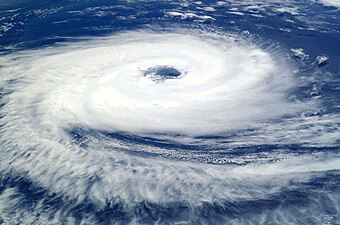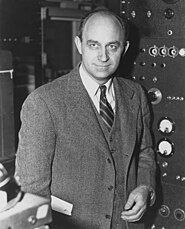Portal:Energy
| Main page | New articles & Tasks |
 The Energy Portal Welcome to Wikipedia's Energy portal, your gateway to energy. This portal is aimed at giving you access to all energy related topics in all of its forms.
|
Page contents: Selected article • Selected image • Selected biography • Did you know? • General images • Quotations • Related portals • Wikiprojects • Major topics • Categories • Help • Associated Wikimedia |
Introduction
In physics, energy (from Ancient Greek ἐνέργεια (enérgeia) 'activity') is the quantitative property that is transferred to a body or to a physical system, recognizable in the performance of work and in the form of heat and light. Energy is a conserved quantity—the law of conservation of energy states that energy can be converted in form, but not created or destroyed. The unit of measurement for energy in the International System of Units (SI) is the joule (J).
Common forms of energy include the kinetic energy of a moving object, the potential energy stored by an object (for instance due to its position in a field), the elastic energy stored in a solid object, chemical energy associated with chemical reactions, the radiant energy carried by electromagnetic radiation, and the internal energy contained within a thermodynamic system. All living organisms constantly take in and release energy.
Due to mass–energy equivalence, any object that has mass when stationary (called rest mass) also has an equivalent amount of energy whose form is called rest energy, and any additional energy (of any form) acquired by the object above that rest energy will increase the object's total mass just as it increases its total energy.
Human civilization requires energy to function, which it gets from energy resources such as fossil fuels, nuclear fuel, or renewable energy. The Earth's climate and ecosystems processes are driven by the energy the planet receives from the Sun (although a small amount is also contributed by geothermal energy). (Full article...)
Selected article
Acceptance of peak oil is far from universal, and the only reliable way to identify its existence will be in retrospect. One alternative scenario is that global production will eventually follow an 'undulating plateau' for one or more decades before declining slowly.
Having accurately predicted the date of peak production in the US petroleum industry, which occurred in 1970, M. King Hubbert, who devised the theory, forecast that the world peak would occur in 1995 'if current trends continue'. Various subsequent predictions have been made as trends have fluctuated in the intervening years. Two milestones have passed, however. The peak of world oilfield discoveries occurred in 1965 and, due world population growth, production per capita peaked in 1979.
The effects of peak oil could be mitigated through conservation and switching to alternative fuels or unconventional oil sources. Such changes would bring their own challenges, ranging from the need to development alternative technologies to potential increases in greenhouse gas emissions.
Selected image

Photo credit: Johnson Space Center/NASA
Tropical cyclones feed on the heat released when moist air rises and the water vapor condenses.
Did you know?
- Samuel Andrews (1836–1904) was an English-born chemist and inventor whose request for investment capital to build an oil refinery in 1862 led to a partnership with John D. Rockefeller and the formation of the Standard Oil companies?
- Golar Spirit (pictured) is the world's first floating storage and regasification vessel converted from a LNG carrier?
- The Rockies Express Pipeline, currently under construction, will be one of the largest natural gas pipelines ever built in North America?
- Syncrude Canada Ltd. is the world's largest producer of synthetic crude oil from oil sands?
- During World War II, Australia produced almost 500,000 barrels of shale oil by operating the Nevada–Texas–Utah type of oil-shale retorts?
- The Sangtuda 1 Hydroelectric Power Plant is expected to provide up to 12% of the total energy output of Tajikistan?
Selected biography
Fermi was well-known for his simplicity in solving problems. Whenever possible, he avoided complicated mathematics and obtained quick results based on order of magnitude estimates. Fermi also meticulously recorded his calculations in notebooks, and later used to solve many new problems that he encountered based on these earlier known problems.
After accepting the 1938 Nobel Prize in Stockholm, Fermi immigrated to New York with his family to escape the anti-Semitic laws of Fascist Italy, as his wife Laura was Jewish.
After working at Columbia University, Fermi went to the University of Chicago and began studies that led to the construction of the world's first nuclear reactor Chicago Pile-1 (CP-1). The first artificial, self-sustaining, nuclear chain reaction was initiated within CP-1, on December 2, 1942.
General images
Quotations
- "Our children will enjoy in their homes electrical energy too cheap to meter." – Lewis Lichtenstein Strauss, 1954
- "There is every possibility that you will soon be able to tax it." – Michael Faraday, talking to William Gladstone on the future purpose of electricity.
- "Higher energy prices act like a tax. They reduce the disposable income people have available for other things after they've paid their energy bills." – John W. Snow, 2005
- "Our dependence on foreign energy is like a foreign tax on the American people." – George W. Bush, 2005
Related portals
WikiProjects
WikiProjects connected with energy:
Other WikiProjects that may be of interest:
Major topics
Major categories
National energy supply, use & conservation
National electricity sector
Politics, economics, environment
- Climate change
- Energy conservation
- Energy economics
- Energy crises
- Energy development
- Energy policy
- Peak oil
Energy sources
- Fuels
- Biofuels
- Fossil fuels
- Fusion power
- Nuclear technology
- Renewable energy
- Energy conversion
- Electric power
- Energy storage
Energy-related design
Scientific usage
Help

Puzzled by energy?
Can't answer your question?
Don't understand the answer?
- Ask at the reference desk
- Read the Wikipedia help pages
For further ideas, to leave a comment, or to learn how you can help improve and update this portal, see the talk page.
Associated Wikimedia
The following Wikimedia Foundation sister projects provide more on this subject:
-
Commons
Free media repository -
Wikibooks
Free textbooks and manuals -
Wikidata
Free knowledge base -
Wikinews
Free-content news -
Wikiquote
Collection of quotations -
Wikisource
Free-content library -
Wikiversity
Free learning tools -
Wiktionary
Dictionary and thesaurus





























































































































































































